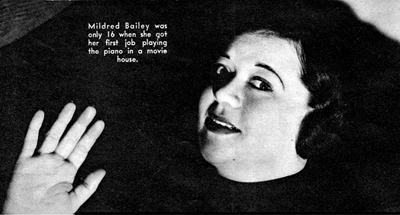Regular listeners to Cladrite Radio know we’re big fans of Mildred Bailey. She’s perhaps not as well remembered today as some of her contemporaries, but fans of the music of the 1920s and ’30s know her well, and her versatile vocal stylings clearly proved an inspiration to songbirds who followed her, including Billie Holiday and Ella Fitzgerald.
Bailey was married three times—her third husband, who proved to be a charm only professionally, was vibraphonist Red Norvo. Though their marriage didn’t last, the two recorded together from the mid-’30s through 1945. Bailey, who had health issues throughout her adult life, struggling with weight gain and diabetes, died far too young—at age 44—in 1951.
Read to the end of this profile, first published in 1935, and you’ll find a couple of our favorites Mildred Bailey recordings for your consideration. We’re confident that, if you’re not already a fan, you will be after hearing these recordings..

 Another brother, Miles, played saxophone in the college band at the University of Illinois and brother Charles (Chuck) Rinker played the guitar and sang his way through the University of California and later was vocalist with several big orchestras. He is now one of Tin-Pan Alley’s best known song pluggers.
Another brother, Miles, played saxophone in the college band at the University of Illinois and brother Charles (Chuck) Rinker played the guitar and sang his way through the University of California and later was vocalist with several big orchestras. He is now one of Tin-Pan Alley’s best known song pluggers.
Mildred Bailey—“A Porter’s Love Song to a Chambermaid”

